

An array of significant global events has unfolded recently, casting a spotlight on ongoing international conflicts and the pursuit of justice. These stories intertwine the complex realms of nuclear diplomacy, regional conflicts, and international law, providing a window into the persistent quest for peace and order.
In a notable development, the White House reported that recent military actions have significantly impacted Iran’s nuclear facilities. This announcement came in the wake of assertions by the CIA that U.S. strikes had successfully compromised Iran’s nuclear capacity. The CIA’s findings align with the White House’s stance, claiming substantial damage to Iranian nuclear endeavors, a move seen as pivotal to international security efforts. However, contrasting views have emerged from the Israeli Atomic Energy Commission, which suggests a more tempered view. According to their assessments, the damage, though existent, might only set back Iran’s endeavors by a few months, underscoring the complexity of intelligence interpretations and international oversight.
Beyond military aspects, Iran is seeing an internal pivot as well. Following a ceasefire agreement with Israel, Iranian authorities have intensified internal security operations. This shift is marked by numerous arrests and a heightened military presence, particularly in areas like the Kurdish region. Reports indicate an increase in political and security arrests, a move that highlights the government’s focus on internal stability amid external tensions.
Turning attention to Europe, Ukrainian leadership and the Council of Europe have taken a noteworthy step by signing an agreement aiming to establish a tribunal dedicated to addressing war-related issues in Ukraine. President Volodymyr Zelenskyy expressed optimism about this tribunal, citing it as an opportunity to seek justice against those responsible for the ongoing conflict in Ukraine. This tribunal is aimed not only at unveiling the truth but also at offering a platform to try high-ranking officials, including Russian President Vladimir Putin, for the invasion. This initiative underscores Ukraine’s commitment to justice and accountability, reinforcing the importance of international legal frameworks in conflict resolution.
In a related geopolitical discourse, former U.S. President Donald Trump weighed in on the situation, voicing concerns at a recent NATO summit. Trump highlighted the intricacies surrounding the ongoing negotiations for a Ukrainian ceasefire, expressing concerns over potential further incursions by Russia beyond Ukraine’s borders. His remarks point to the difficulties in diplomatic engagements and the complexities of geopolitical strategies.
Tragic events continue to unfold in Sudan, where a recent attack on a hospital in West Kordofan resulted in the loss of more than 40 civilian lives, including health workers and children. The World Health Organization condemned this attack, emblematic of the immense humanitarian challenges Sudan faces amid its civil war. The conflict between the Sudanese military and paramilitary forces has culminated in dire humanitarian circumstances, marked by suffering and loss.
These developments collectively emphasize the interplay of military actions, diplomatic efforts, and humanitarian considerations that permeate global affairs. As nations navigate these multifaceted challenges, the pursuit of peace, justice, and stability remains a common thread in the intricate tapestry of international relations. It is through calm and mindful attention to these issues that we can strive towards a future characterized by harmony and justice.
Source: {link}
